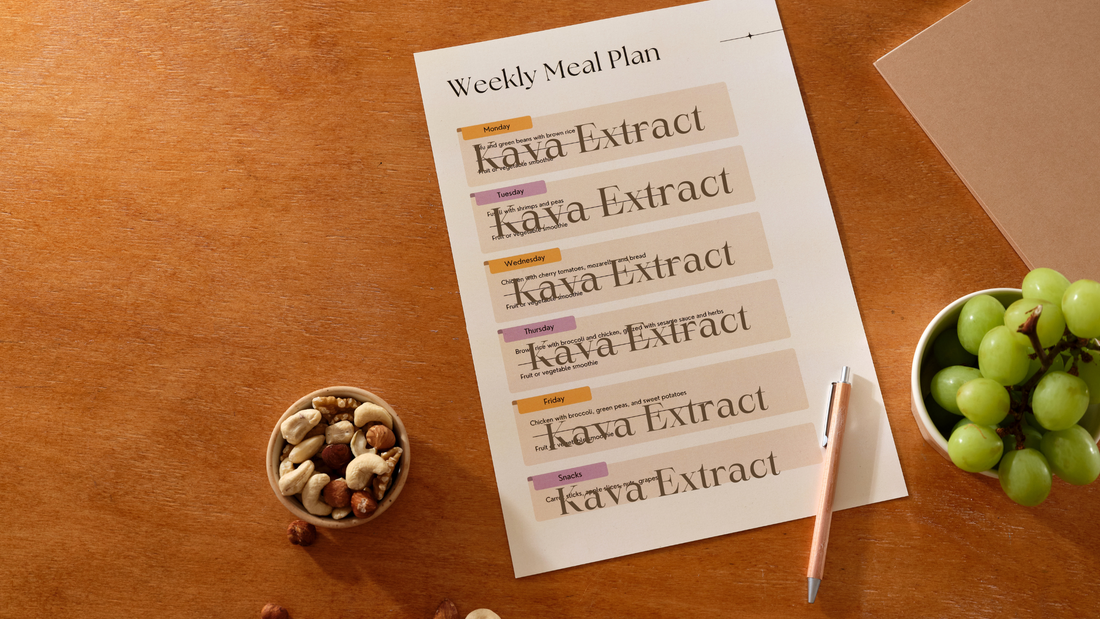
Kava and Your Diet: Restrictions and Recommendations
Share
Kava is a type of elixir that has been cherished for hundreds of years in the South Pacific due to its deeper states of tranquility and social ease. But few people realize how profoundly their diet can either enhance or weaken kava's calming effects. Unraveling the complex relationship between kava and diet shows how one can tap into the full power of this ancient root.
With kava's increased popularity worldwide, the clarity regarding dietary pairing becomes more crucial. Be it relaxation or a feeling of community; it's up to you to make sure your meals align with kava's special dietary needs. Learn how to elevate your experiences with kava and protect your well-being by embracing personalized dietary habits.
Kava's Nutritional Profile
The magic in kava lies in its kavalactones, the active ingredients that cause everything from mild euphoria to profound states of relaxation through their interaction with the central nervous system. But more significantly than themselves, kavalactones are end instituted in other elements that add onto the overall impact of kava on the body. Namely, flavonoids and alkaloids add to the overall impact kava has on the body.
It's essential to learn how these chemicals are broken down in the liver, and how their action might be modified by other foods or preparations that you might take with them. The presence of a food, for example, might amplify or inhibit the action of kavalactones.Designing a Diet that Supports Kava
A well-rounded diet is the key to enhancing the potential benefits of kava and reducing possible side effects. Nutrient-dense foods filled with vital vitamins and minerals, such as fresh fruits, vegetables, lean proteins, and whole grains, will help your body metabolize kava for maximum benefit. The healthy food choices not only nourish the body but also balance sugar levels in the blood, which is an important factor in taking kava.
Foods to Avoid with Kava
Certain foods can throw off the balance that kava tries to establish in the body. Foods high in fat can interfere with the absorption of the kavalactones and may blunt the desired effects of the kava. Processed foods, heavy with additives and preservatives, can put stress on your liver, the primary organ responsible for kava metabolism.
Special caution is required with alcohol and caffeine. Both substances interfere with the calming properties of kava-alcohol by overburdening the liver, caffeine by counteracting kava's sedative effects.
Kava and Liver Health: Priorities
Your liver is unsung in this kava experience, filtering the kavalactones and so many of the dietary components you might be consuming in combination with the kava. To make your liver work more optimally now and for the rest of your life, a diet heavy in antioxidant foods like berries, leafy greens, and nuts will help cleanse toxins from the body and promote healthy liver function.
Adding to that, foods containing sulfur, such as garlic and onions, can enhance your liver's capability in metabolizing kava. On the other hand, diets with high levels of saturated fats and processed sugars should be limited to avoid liver inflammation and ensure safety with kava consumption.
Hydration: A Key Companion to Kava
Kava is a natural diuretic; thus, if one does not balance the amount of water intake, one will become dehydrated. Water should be taken throughout the day and particularly by those who consume kava regularly. Among such hydration drinks, herbal teas or coconut water will be the most suitable options to create an evened experience with kava, without adding caffeine or too much sugar.
Combining Kava with Herbal Supplements
Although kava is a natural herb, it doesn't always play well with other herbal supplements. Kava should not be combined with sedating herbs like valerian or passionflower since it can increase drowsiness-too sedating is the result.
Some combinations can be both safe and beneficial. For example, chamomile can complement the soothing effects of kava without overwhelming the system. It will be wise to consult a healthcare professional before mixing kava with other herbs to avoid adverse interactions.
Kava Mixing Considerations: Avoiding Adverse Interactions
Timing and Dosage: Fine-Tuning Your Kava Experience
Timing can make all the difference with kava. Taken on an empty stomach, it interacts differently-it's absorbed quicker, and hits faster, while taking it after a meal causes a more gradual onset of the drug.
Dosage is just as important. Higher dosages of kava would call for extra nutritional support, especially from those foods that help the liver function. Lower dosages would require less food adjustment yet still show some benefits with a diet focusing on overall wellness.Accepting the Cultural and the Modern Dietary Habits
In the South Pacific, kava has been taken traditionally with certain foods said to magnify its action. For example, Fijians will take kava with starch vegetables such as taro or cassava that have a grounding action.
The modern dietary approach might prefer lighter, more digestible food that would not clash with a Western lifestyle. Salads with lean proteins and complex carbohydrates will give one energy without making the body struggle with hard digestion.
Conclusion
The intersection of kava with diet consideration is such an important point for those seeking to optimize the benefits derived from this ancient elixir. In selecting foods and beverages that complement kava, and in turn, avoiding foods that may interfere with it, users will be better assured of safety while experiencing enhancement thoughtfully. A nutrient-filled diet, based on liver health and hydration, can truly allow one to enjoy kava to the fullest.
Kava products from Healing Herbals.
Read more about KAVA:










